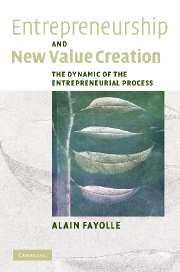Book contents
- Frontmatter
- Contents
- List of figures
- List of tables
- Foreword
- Acknowledgements
- Introduction
- Part I Perceptions of entrepreneurship
- 1 Entrepreneurship as a social and economic phenomenon
- 2 Entrepreneurship as a field of research
- 3 Entrepreneurship as an academic subject
- Part II Entrepreneurship and the entrepreneurial system
- Part III Entrepreneurship and entrepreneurial processes
- Part IV Entrepreneurial process dynamics
- Conclusion
- References
- Index
3 - Entrepreneurship as an academic subject
Published online by Cambridge University Press: 22 September 2009
- Frontmatter
- Contents
- List of figures
- List of tables
- Foreword
- Acknowledgements
- Introduction
- Part I Perceptions of entrepreneurship
- 1 Entrepreneurship as a social and economic phenomenon
- 2 Entrepreneurship as a field of research
- 3 Entrepreneurship as an academic subject
- Part II Entrepreneurship and the entrepreneurial system
- Part III Entrepreneurship and entrepreneurial processes
- Part IV Entrepreneurial process dynamics
- Conclusion
- References
- Index
Summary
Entrepreneurship is an economic and social phenomenon, a research object, and, more and more, an academic and teaching subject. It becomes particularly obvious when one looks at the fast-increasing number of universities all over the world that propose entrepreneurship programmes and courses. Two recent articles (Katz 2003; Kuratko 2005) published in leading reviews in the field propose, each in its own way, a comprehensive literary review of the subject aimed at defining the characteristics of this development as well as its limitations and challenges. Entrepreneurship education has come a long way since the first ever entrepreneurship course proposed by Myles Mace at Harvard University (Katz 2003). Today, figures show a real boom in this type of training in the United States (Kuratko 2005): 2200 courses in more than 1600 institutions, 277 endowed positions, 44 academic reviews and more than 100 established and funded entrepreneurship centres. In view of these data, we could think that the field is well established; however nothing could be further from the truth, and numerous epistemological, theoretical, pedagogical and practical challenges remain. As we have previously noted, there is no consensus on what entrepreneurship is. In these conditions, how could there be a consensus on what entrepreneurship as a teaching subject is? Some people, especially from the old school, still ask the question: can entrepreneurship be taught?
- Type
- Chapter
- Information
- Entrepreneurship and New Value CreationThe Dynamic of the Entrepreneurial Process, pp. 49 - 66Publisher: Cambridge University PressPrint publication year: 2007

